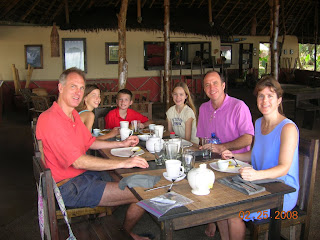A Visit from Home II - Sand Castling
Safari Beach could well be our favorite place on Earth and I'm not sure why. The beach is wonderful but the ocean has often been too rough for us to do much swimming without feeling beat up. The sand is nice for building castles, though they are gone by morning. The sleeping accommodations are beautiful, but hot if the ocean breeze dies down. The food is outstanding.
 and fell in love with the area, and decided to build a resort that went after a different market (read: upscale). Almost a year ago they had a baby boy, Parker, as did the owners of the Green Turtle, though I don't know if they had a boy or girl. Angela & James' resort has the feel of being welcomed into someone's home, without the awkwardness. There is attention to detail, and elegant simplicity, and of course some of the best food we have ever tasted.
and fell in love with the area, and decided to build a resort that went after a different market (read: upscale). Almost a year ago they had a baby boy, Parker, as did the owners of the Green Turtle, though I don't know if they had a boy or girl. Angela & James' resort has the feel of being welcomed into someone's home, without the awkwardness. There is attention to detail, and elegant simplicity, and of course some of the best food we have ever tasted.[Parker & Angela]
We come there with stacks of daily comics and Time Magazines saved from the packages Suzanne's mother sends us each week. We spend our time sitting on the beach reading, playing cards or Sorry!, or this time, the game of Risk. And then there is sand castle building.
 [Playing RISK]
[Playing RISK] [Playing SORRY!]
[Playing SORRY!] [Eating Breakfast]
[Eating Breakfast] [Sunset Swim with Suzanne and the kids]
[Sunset Swim with Suzanne and the kids]For some reason much of the sand in Ghana isn't all that w
[Girls playing in the Sand]
Right before we left with Ashley & Karl, I had received an email from a friend who was helping me process change. He wrote about his time in the army, about when his unit changed, which was about every three years. He said at first it really bugged him because returning there in three weeks it was like "you were never there. No pictures on the wall, no heralding of accomplishments etc. I always wondered," he writes, "was it worth it and did I make a difference?" Those words were echoing around in my brain this week-end as Anna, and [Peter, Fox, Maddy, and/or any of the adults] helped her build castles.
.JPG) [The Castle]
[The Castle].JPG) [Gets hit by waves]
[Gets hit by waves]
[And soon it has been washed away]
For those watching, a lot of the conversations centered around what we had been doing here in Ghana; what we've been involved with. For example Suzanne's research topic, One Laptop Per Child-Ghana [click here to read], is about to launch this week or next, and so there is a lot of wondering about the difference it will make in Ghana. Her work in both teaching Computer Science and as Acting Dean of Ashesi is perhaps the most interesting and rewarding work she has done in her lifetime. But if my friend is correct, in five months (one month after we are gone), it might be as if she never was there. I know that was my Dad's experience. My sister Beth writes "Dad used to say that he looked upon his teaching there as like footprints in the sand, of no lasting effects." I am not so sure. Someone once wrote: "What you do may not change the world, but it will change you," and that has been my tag line for the last few weeks and perhaps my life. I know living in Ghana in 1968-69 certainly did change me, even if it missed the rest of the world. It all reminds me of something attributed to John Wesley, "Through prayer, God changes you so that you can change the world."

But getting back to the beach, it was wonderful to have friends from home, people who have firsthand knowledge of the primary season, and how interesting it has been. Its fun to hear of the latest fads, trends, and what occupies the lives of our friends. Its especially fun to have long term friends, ones who have known us long enough to have seen the changes, and not get lost in them. And then it is fun to get to know their kids, and watch them play with ours.

Anna and Maddy became fast friends, being only one year apart and pretty much went everywhere together. Peter tagged along and was a good sport about it. When he was included it was fine, and when he wasn't, like many lastborn's, he was quite self sufficient.
Ashley and Karl have traveled extensively with their kids, and it shows as they didn't even blink .JPG)


 [Sign outside the bathrooms in Cape Coast]
[Sign outside the bathrooms in Cape Coast]  [Taxi & Trotro repair yard]
[Taxi & Trotro repair yard]




 We're not sure if the Haramatton came back, or just everyone in mass decided to burn their trash,. Either way, it was very hazy, and dry.
We're not sure if the Haramatton came back, or just everyone in mass decided to burn their trash,. Either way, it was very hazy, and dry.  [Ashley & Suzanne in Trotro]
[Ashley & Suzanne in Trotro] 


























